Online Course
NRSG 780 - Health Promotion and Population Health
Module 6: Social Justice and the Social Determinants of Health
Social Determinants of Health


Watch the following video (6:23) titled How Social, Political Economic Policies Affect Health. This is part of a World Health Organization report in which Sir Michael Marmot, Chair of the Commission on Social Determinants of Health, explains why social, political and economic policies affect health.
Social Determinants of Health (SDH) are the circumstances in which people are born, grow up, live, work and age, and the systems put in place to deal with illness. These circumstances are shaped by a wider set of forces: economics, social policies, and politics – at both local and global levels (WHO, 2008).
Three Principles for Action on the Social Determinants of Health (WHO, 2008)
- Improve the conditions of daily life – the circumstances in which people are born, grow, live, work and age
- Tackle the inequitable distribution of power, money and resources – the structural drivers of those conditions of daily life – globally, nationally and locally
- Measure the problem, evaluate action, expand the knowledge base, develop a workforce trained in the social determinants of health and raise public awareness about the social determinants of health
By following the vision outlined in the Closing the Gap in a Generation report, and through the cooperation of many groups and institutions at local, national and international levels, the Framework for Action on the Social Determinants of Health offers a holistic view of the social challenges to health and the evidence for action to ensure improved health outcomes across the globe.
Levels of Causation & Pathways from Context to Health Outcomes
“A key aim of the framework is to highlight the difference between levels of causation, distinguishing between the mechanisms by which social hierarchies are created, and the conditions of daily life which then result” (WHO, 2010, page 4).
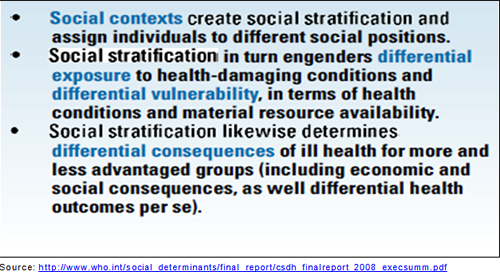
Downstream Social Determinants of Health are factors that are temporarily and spatially close to health effects and outcomes, which are relatively apparent (e.g. health related knowledge, attitudes, beliefs or behaviors related to smoking), but are influenced by upstream factors in the causal pathways influencing health. These downstream factors are also referred to as Intermediary Determinants in the Social Determinants of Health (SDH) framework. They include:
- Material Circumstances
- Behavioral and Biological Factors
- Psychosocial Factors
- Health Systems
Upstream Social Determinants of Health are fundamental, structural causes that set in motion causal pathways leading to (often temporally and spatially distant) health effects and outcomes though downstream factors. These upstream factors, which are outside of the control of the individual, are also referred to as the Structural Determinants in the SDH framework, which include:
- Socioeconomic Position
- Governance/Political Context
- Macroeconomic Policies
- SocioCultural Values
The structural determinants cause and operate through intermediate determinants to shape health outcomes.
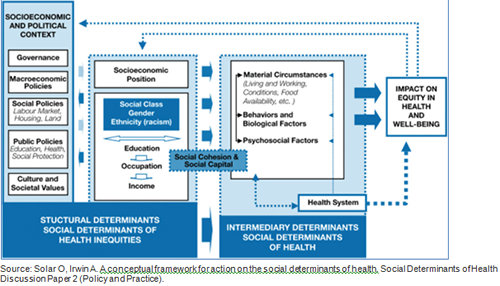
Click here for a copy of the PowerPoint slides that accompanies the presentation given by Dr. Jeffrey V. Johnson, professor and former director of the Office of Global Health discuss “Social Justice and the Social Determinants of Health”.
Review this video (7:31) that profiles two Kansas City area women whose health outcomes are significantly influenced by education, poverty, transportation, crime and neighborhood conditions.
Source: Health Care Foundation of Greater Kansas City (2009). Social Determinants of Health
Exercise
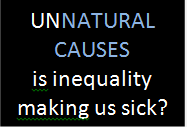
Take a few minutes to read and review the Q&A “Forum # 3: Myths about Health Inequalities.” This is an interview with William Dow, Tony Iton, Dennis Raphael and David Williams. They discuss diet, universal health care, the economic costs of poor health, the “healthy immigrant effect,” and the difference between health disparities and health inequities.
For more information, click here for the full transcript of the interview:
Reflect on the following questions:
- How did you do on this self-quiz? Better/worse than you expected?
- Where there any items/questions/myths that you marked incorrectly? If so, what was your reaction to the expert panelists’ responses to those questions? Do you agree/disagree with their evidence and rationale? Explain.
- Which specific items/questions/myths did you find MOST interesting? How might you start a conversation with others (colleagues, friends, family) about these issues of health equity and the social determinants of health?
- Now (if you have not already done so) utilize the distinctions between downstream factors (intermediary determinants of health) and upstream factors (structural determinants of health) and apply the WHO Framework on the Social Determinants of Health to describe and map out the levels of causation or causal pathways influencing one specific health outcome listed in the self-quiz/interview text.
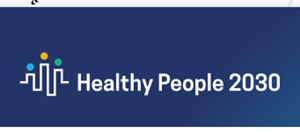
Healthy People 2030 has expanded its emphasis on the social determinants of health (SDOH). One of its five overarching goals is specifically related to the SDOH--“Create social, physical, and economic environments that promote attaining the full potential for health and wellbeing for all.” Healthy People 2030 focuses on five domains that highlight the importance of upstream factors in improving health and reducing disparities:
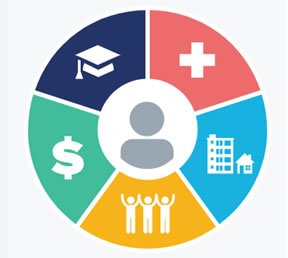
Source: https://health.gov/healthypeople/objectives-and-data/social-determinants-health
- Economic Stability / Goal: Help people earn steady incomes that allow them to meet their health needs.
- Education Access and Quality / Goal: Increase educational opportunities and help children and adolescents do well in school.
- Health Care Access and Quality / Goal: Increase access to comprehensive, high-quality health care services.
- Neighborhood and Built Environment / Goal: Create neighborhoods and environments that promote health and safety.
- Social and Community Context / Goal: Increase social and community support.
For more information, please review https://odphp.health.gov/healthypeople/priority-areas/social-determinants-health
This website is maintained by the University of Maryland School of Nursing (UMSON) Office of Learning Technologies. The UMSON logo and all other contents of this website are the sole property of UMSON and may not be used for any purpose without prior written consent. Links to other websites do not constitute or imply an endorsement of those sites, their content, or their products and services. Please send comments, corrections, and link improvements to nrsonline@umaryland.edu.